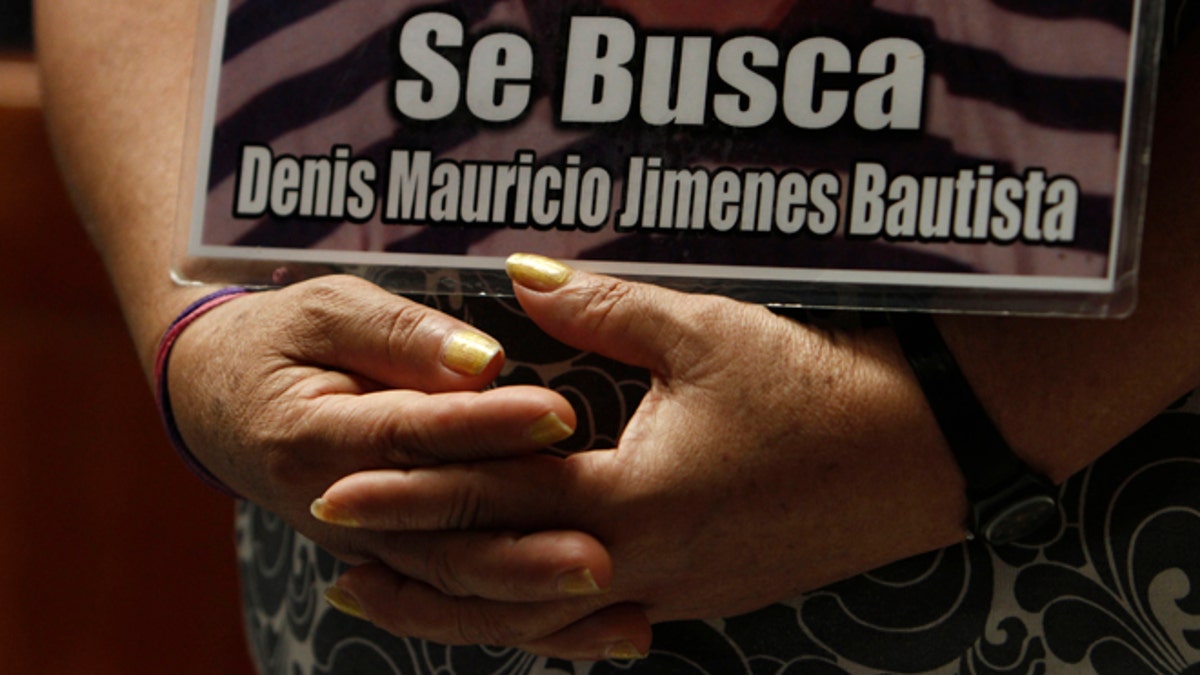
FILE -PHOTO (AP2012)
MEXICO CITY – Mexico's anti-drug offensive is "disastrous" and has caused "the most severe crisis" of disappearances in Latin America in decades, according to a new report from an international human rights organization.
The report by Human Rights Watch released Wednesday cites 249 cases of disappearances that were carried out by the military or law enforcement, according to the report.
The report concluded the "enforced disappearances" follow a pattern in which security forces detain people without warrants at checkpoints, at homes or work places or in public. When victims' families ask about their relatives, security forces deny the detentions or instruct them to look for their loved ones at police stations or army bases.
Human Rights Watch criticized former President Felipe Calderon, saying he ignored the problem that it calls "the most severe crisis of enforced disappearances in Latin America in decades."
An email asking for comment sent to Harvard's Kennedy School of Government, where Calderon is a fellow, was not answered Wednesday.
The report said President Enrique Pena Nieto, who succeeded Calderon on Dec. 1, should act urgently "in cases where people have been taken against their will and their fate is still unknown."
Mexico's Interior Department, which oversees domestic security, declined to make an immediate comment about the report.
A civic organization released a database late last year that it said contained official information on more than 20,000 people who had gone missing in Mexico over the previous six years during the presidency of Calderon, who stepped up the government's campaign against drug cartels.
In posting the database on its website, Propuesta Civica, or Civic Proposal, said the information was collected by the federal Attorney General's Office during Calderon's administration.
Lia Limon, deputy secretary for human rights at the Interior Department, told reporters that the government plans to unveil a database containing more than 27,000 records of missing people that were gathered by the federal Attorney General's Office. She said she had not seen it and did not have details of specific cases.
The missing in Propuesta Civica's database include police officers, bricklayers, housewives, lawyers, students, businessmen and more than 1,200 children under age 11. They are listed one by one with such details as name, age, gender and the date and place where the person disappeared.
Among the examples cited by Human Rights Watch is evidence suggesting that marines detained about 20 people in three northern border states in June and July of 2011. Though it denied abducting the victims, Mexico's navy later acknowledged it had contact with some before they disappeared.
In one such case, Jose Fortino Martinez Martinez was sleeping with his wife and four children at their home in the northern border town of Nuevo Laredo when he was woken by the sound of his door being knocked down. That night in June 2011, eight masked men burst into his bedroom carrying automatic rifles and bulletproof vests with "Marina," Navy in Spanish, written on them.
Martinez, 33, was taken away by those men, according to the several of his neighbors who testified at the time. Although naval officials denied arresting him, they said weeks later that they would investigate if marines were involved.
So far, nothing is known of Martinez's whereabouts.
The report also said security personnel sometimes work with criminals, detaining victims and handing them over to gangs. The report cited incidents in which investigators used information collected in a case to pose as kidnappers and demand ransom payments from the victims' families.
Authorities frequently fail to take even the most basic investigative steps, such as tracing victims' cellphone or bank records, and often rely on investigations carried out by the victims' relatives, the report said.
Human Rights Watch recommended that the Mexican government take concrete steps to change security procedures, including issuing new rules requiring that detainees be taken immediately to prosecutors' offices and not be held at military bases or police stations.
Based on reporting by the Associated Press.
Follow us on twitter.com/foxnewslatino
Like us at facebook.com/foxnewslatino






































